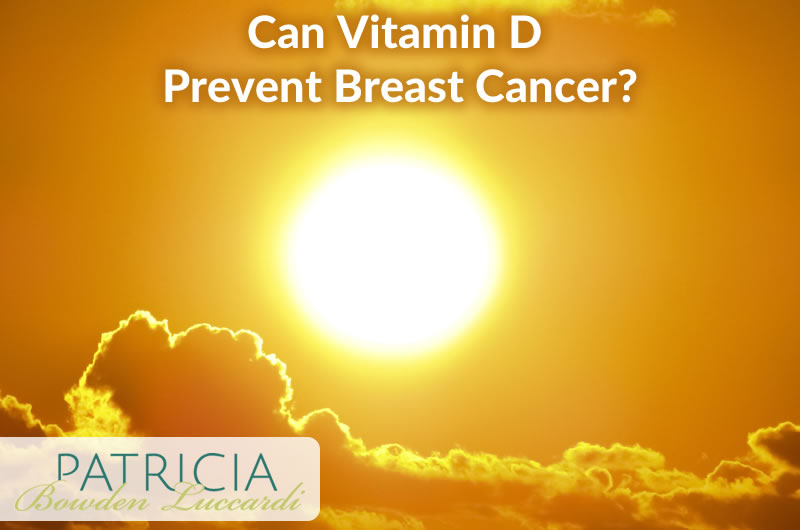Can Vitamin D Prevent Breast Cancer?
Leave a Comment
With summer not too far away, you may think your vitamin D will soon be back to optimal levels.
But if that’s what you think, you can think again.
Functional medicine guru Dr. Mark Hyman says, “Unless you live 20 minutes south of Atlanta, and you are outside totally naked for 15 minutes a day in the sun, you need vitamin D.”
African Americans and other dark-skinned people, along with those living in northern latitudes, make significantly less vitamin D than other groups. The darker your skin is, the less likely it is you will produce adequate vitamin D levels from sun exposure alone.
That being said, it is important to get vitamin D3 through diet, sunlight, or supplements every day.
This is because when vitamin D is sent directly to the body’s tissues it is only active for 24 hours. So, to boost our immune system and ward off cancer we need new input every day.
Vitamin D impacts our bones, regulates calcium and strengthens our immune system. What’s more, researchers have found that vitamin D directly affects the cells in the breast.
Vitamin D influences virtually every cell in your body and is one of nature’s most potent cancer fighters.
Inside almost every cell in the body is a vitamin D receptor (VDR). A VDR is a protein that controls the expression of genes. The vitamin D in our blood enters breast cells, binds to the VDRs, and triggers positive change. Vitamin D is also able to enter cancer cells and trigger natural cell death, preventing, slowing, or even stopping cancer growth.
There have been many studies on vitamin D and breast cancer that demonstrate a 50-80% lower risk of breast cancer diagnosis for women with serum levels of >40 ng/ml versus levels of 25 ng/ml or lower.
According to Dr. Cedric F. Garland, a professor of family and preventive medicine, “As long as vitamin D receptors are present, tumor growth is prevented and kept from expanding its blood supply. Vitamin D receptors are not lost until a tumor is very advanced. This is the reason for better survival in patients whose vitamin D blood levels are high.”
Researchers at Georgetown University Medical Center in Washington D.C. discovered a connection between high vitamin D intake and a reduced risk of breast cancer.
These findings, which were presented at the American Association for Cancer Research, revealed that increased dosage of the sunshine vitamin was linked to a 75% reduction in overall cancer growth and a 50% reduction in tumor cases among those already having the disease.
Vitamin D supplementation helped control the development and growth of breast cancer, especially with estrogen-sensitive breast cancer.
Rochester Medical Center examined vitamin D levels in 155 breast cancer patients in the months before and after surgery. They found suboptimal levels to be highly predictive of the biological markers associated with more aggressive tumors.
The average level in patients with breast cancer in the United States is 17 ng/ml.
At any rate, having an optimal vitamin D serum level helps to prevent a wide variety of diseases and other health issues. Vitamin D levels need to be between 50 and 70 ng/ml year round. According to recent findings from the D*action study, adults need about 8,000 IUs of D3 per day to get serum levels above 40 ng/ml.
If you take high doses of oral vitamin D3 supplements, you may also need to increase your vitamin K2 intake, as vitamin D increases the need for K2 so your body can absorb calcium.
There is new evidence that vitamin K2 directs the calcium to your skeleton, while preventing it from being deposited where you don’t want it.
The tricky thing about vitamin D deficiency is that there aren’t any symptoms until you are really depleted. Only a blood test can check vitamin D levels.
Insurance pays for D testing. But if you’re without insurance, there are independent labs online that will do the test.
Conventional health experts tell us that a level of 20 ng/ml to 50 ng/ml is considered adequate for healthy people and anything below 12 ng/ml is a deficiency.
But the truth is those are reckless, risky numbers. Optimal ranges are 50-70 ng/ml. Again, it is best to monitor your Vitamin D levels through a blood test.
When in doubt, always choose optimal over normal or adequate.
In any case, whenever you can, try to get out and enjoy the sun, and if you use sunscreen, make sure it’s natural.
You should also make a point of doing regular breast cancer screening via thermography and/or ultrasound and don’t forget to take your vitamin D!
Offering Breast, Upper Body and Full Body Exams
Contact me to book your thermography appointment today.
